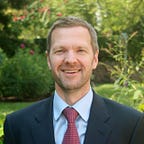During the holiday season, 250 miles might not seem far. But this isn’t your average road trip: it’s the distance to the International Space Station. Today, we celebrate Tim Peake, who will become the first British European Space Agency astronaut to go to the International Space Station. He’ll call the ISS home for five months — even venturing outside for a few spacewalks to get some fresh air. On his playlist for his time? “Starlight” by Muse and “Learn to Fly” by the Foo Fighters, of course. And in April, Tim will be running the London Marathon from space — on a treadmill, that is. Back on Earth, space excitement has gripped the UK. Even the Prime Minister has sent Tim a message of good luck.
But as anyone who’s seen Gravity can tell you, being an astronaut isn’t always a cake walk (or a moonwalk for that matter). It requires a tremendous amount of training, and it’s taken years for Tim to get to this point. A veteran British Army Officer, he beat over 8,000 applicants for one of six places on the ESA’s training programme. In doing so, he has joined the next generation of explorers and become an inspirational role model for young people across the world, encouraging them to take up science and maths.
While Tim is the first Brit European Space Agency astronaut to visit the ISS, he isn’t the only British astronaut. Seven other UK nationals have gone into space, and Britain has a long tradition of scientific exploration. We’re home to the British Interplanetary Society, the oldest space advocacy organization in the world and which is credited with inventing the first instrument for space navigation. Virgin Galatic, founded by British entrepreneur Richard Branson, is also developing commercial spacecraft with the aim of creating a new “space tourism” industry.
Mr. Branson’s initiative is just one example of the UK’s booming space entrepreneurship. The UK space industry contributes £11.8 billion to the British economy and continues to grow. The industry employs more than 37,000 engineers, researchers and software designers and aims to create 100,000 new jobs by 2030.
The UK is also home to a burgeoning small satellite industry. UK-built telecommunication satellites account for 25% of the world market. Innovative British businesses like Avanti Communications are working with partners in Africa to use satellite technology to improve flight safety, reduce traffic accidents and support economic development. And a £32 million UK government-funded programme aims to extend our global reach further, by sharing British expertise in real-world satellite technology.
Today, around 100 foreign-owned space firms call the UK home. Those companies are forging connections with the UK and allowing us to discover more about our solar system. Thanks to a UK collaboration with Japan and the US, the solar science mission, Hinode, has made exciting new discoveries about the Sun’s magnetic field.
We are also exporting around the world, including to the US. The UK led the development of the James Webb Space Telescope, the successor to the Hubble, along with scientists and engineers from Europe, the US and Canada. And in June, the UK’s Satellite Applications Catapult signed an MoU with the Houston Spaceport, creating a partnership between US and UK businesses that will harness satellite data to develop innovative new services.
We’re tremendously proud of the Brits who are working in the air and on the ground to keep us leading in aerospace and space exploration. That, of course, includes Tim Peake as he heads to the ISS.
Earlier this year, I tweeted Tim to ask what he would take into space to remind him of the UK. His response was typically British: tea. So next time you make yourself a “cuppa”, we encourage you to follow his incredible journey into space @astro_timpeake — to “infinitea” and beyond!
